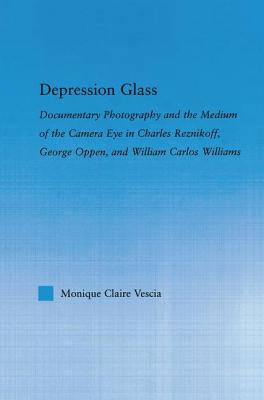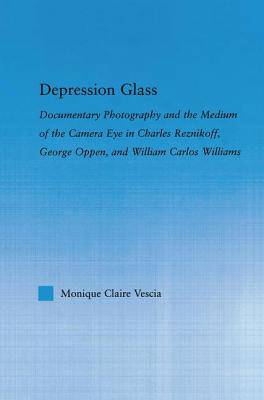
- Afhalen na 1 uur in een winkel met voorraad
- Gratis thuislevering in België vanaf € 30
- Ruim aanbod met 7 miljoen producten
- Afhalen na 1 uur in een winkel met voorraad
- Gratis thuislevering in België vanaf € 30
- Ruim aanbod met 7 miljoen producten
Zoeken
Depression Glass
Documentary Photography and the Medium of the Camera-Eye in Charles Reznikoff, George Oppen, and William Carlos Williams
Monique Vescia
€ 45,95
+ 91 punten
Uitvoering
Omschrijving
This interdisciplinary study examines the interrelations between the documentary poetics of "Objectivism" in the United States during the 1930s. Focusing on three volumes published by the Objectivist Press in 1934--Charles Reznikoff's Testimony, George Oppen's Discrete Series, and William Carlos William's Collected Poems, 1921-1931--the book examines both photographic and linguistic images, along with criticism, correspondence, transcripts of interviews and lectures, contemporary periodicals and other documentary sources from these years. Reznikoff, Oppen, and Williams each constructed textual objects that aspired to the condition of the photograph, and the successes as well as the failures of that aspiration are the subject of this book. Juxtaposing selected works by these three poets with the camera work of Walker Evans, Lewis Hine, and Alfred Stieglitz, Depression Glass also exposes some of the fundamental affinities between documentary photography and modern poetry as forms of expression. This study challenges some of the critical commonplaces of American modernism by demonstrating how these poets comprised an alternative "tradition" dedicated to a project of social realism that would later become the exclusive territory of prose.
Specificaties
Betrokkenen
- Auteur(s):
- Uitgeverij:
Inhoud
- Aantal bladzijden:
- 174
- Taal:
- Engels
- Reeks:
Eigenschappen
- Productcode (EAN):
- 9781138812536
- Verschijningsdatum:
- 8/06/2015
- Uitvoering:
- Paperback
- Formaat:
- Trade paperback (VS)
- Afmetingen:
- 150 mm x 224 mm
- Gewicht:
- 272 g

Alleen bij Standaard Boekhandel
+ 91 punten op je klantenkaart van Standaard Boekhandel
Beoordelingen
We publiceren alleen reviews die voldoen aan de voorwaarden voor reviews. Bekijk onze voorwaarden voor reviews.











